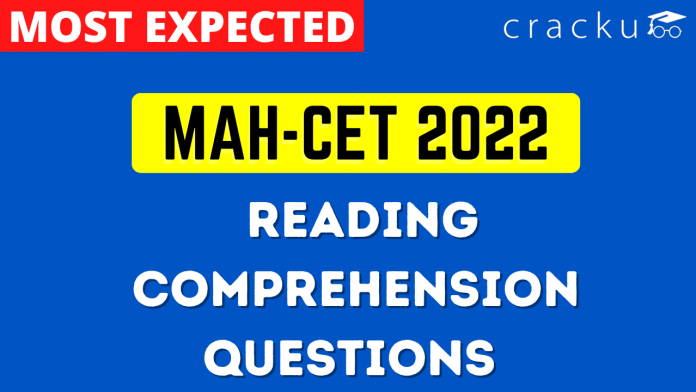Reading Comprehension Questions for MAH-CET
Here you can download a free Reading Comprehension questions PDF with answers for MAH MBA CET 2022 by Cracku. These are some tricky questions in the MAH MBA CET 2022 exam that you need to find the answers to the given Reading Comprehension questions. These questions will help you to practice and solve the Reading Comprehension questions in the MAH MBA CET exam. Utilize this PDF practice set, which is one of the best sources for practising and includes detailed answers. Click on the below link to download the Reading Comprehension MCQ PDF for MAH MBA CET 2022 for free.
Download Reading Comprehension Questions for MAH-CET
Enroll to MAH-CET 2022 Crash Course
Instructions
Read the passage given below and answer the following questions
Firms are said to be in perfect competition when the following conditions occur: (1) many firms produce identical products; (2) many buyers are available to buy the product, and many sellers are available to sell the product; (3) sellers and buyers have all relevant information to make rational decisions about the product being bought and sold; and (4) firms can enter and leave the market without any restrictions—in other words, there is free entry and exit into and out of the market.
A perfectly competitive firm is known as a price taker, because the pressure of competing firms forces them to accept the prevailing equilibrium price in the market. If a firm in a perfectly competitive market raises the price of its product by so much as a penny, it will lose all of its sales to competitors. When a wheat grower, wants to know what the going price of wheat is, he or she has to go to the computer or listen to the radio to check. The market price is determined solely by supply and demand in the entire market and not the individual farmer. Also, a perfectly competitive firm must be a very small player in the overall market, so that it can increase or decrease output without noticeably affecting the overall quantity supplied and price in the market.
A perfectly competitive market is a hypothetical extreme; however, producers in a number of industries do face many competitor firms selling highly similar goods, in which case they must often act as price takers. Agricultural markets are often used as an example. The same crops grown by different farmers are largely interchangeable. According to the United States Department of Agriculture monthly reports, in 2015, U.S. corn farmers received an average price of $6.00 per bushel and wheat farmers received an average price of $6.00 per bushel. A corn farmer who attempted to sell at $7.00 per bushel, or a wheat grower who attempted to sell for $8.00 per bushel, would not have found any buyers. A perfectly competitive firm will not sell below the equilibrium price either. Why should they when they can sell all they want at the higher price?
Source: Principles of Economics, Download for free at http://cnx.org/content/col11613/latest.
Question 1: Choose the word that is synonymous with the word “Hypothetical” as used in the passage.
a) Theoretical
b) Incidental
c) Exploitative
d) Superlative
e) Abstract
1) Answer (A)
Solution:
The author says that the idea of perfectly competitive market is a “hypothetical” extreme but similar though not exactly same conditions exist in many industries. Hypothetical, as used in the passage, means theoretical. Hence, option A.
Question 2: Choose the word that is synonymous with the word “Prevailing” as used in the passage.
a) Deterministic
b) Conquering
c) Current
d) Popular
e) Redundant
2) Answer (C)
Solution:
The passage refers to “prevailing equilibrium price” which refers to the price existing in the market at that particular point of time. Hence, current is synonymous with prevailing as used in the passage.
Question 3: What is the purpose of the passage?
a) To encourage perfect competition in all fields
b) To explain how an individual producer is a price taker in a perfectly competitive market
c) To explain why perfect competition is hurting our farmers
d) To explain supply and demand economics to the reader
e) None of the above
3) Answer (B)
Solution:
The passage explains how the price of a good is set in a market with perfect competition and goes on to explain why a producer cannot individually decide the price in cases where perfect competition exists. Hence, option B.
Question 4: From the passage, it can be inferred that the author is a
a) Wheat Farmer
b) Economist
c) Agricultural Scientist
d) Manufacturer
e) Book Critic
4) Answer (B)
Solution:
The passage gives us the economic theory behind the concept of perfect competition. As an economics concept is explained, the author is likely to be an Economist.
Question 5: Which of the following can be inferred from the information given in the passage?
I) A perfectly competitive market does not exist in real life
II) A firm in a perfectly competitive market cannot sell its products below market price due to regulations
III) Agriculture is the only sector in which there is perfect competition
a) I only
b) II only
c) I and II only
d) III only
e) II and III only
5) Answer (A)
Solution:
The passage says that a perfectly competitive market is a “hypothetical extreme” i.e. it is merely theoretical and not practical. Thus, we can infer statement I. Statement II is not stated in the passage and III is not true according to the passage. Hence, option A.
Take Free MAH-CET mock tests here
Enrol to 5 MAH CET Latest Mocks For Just Rs. 299
Question 6: Why, according to the author, must a perfectly competitive firm be a small player in the overall market?
a) The firm should not have higher bargaining power due to its significant size
b) The firm should not have higher profit margins than its competitors due to economies of scale
c) The increase or decrease in output of the firm should not alter the supply available in the market and hence indirectly affect the market price
d) A large player may affect the flow of information in the overall market thereby distorting the market price
e) None of the above
6) Answer (C)
Solution:
The passage states that “a perfectly competitive firm must be a very small player in the overall market, so that it can increase or decrease output without noticeably affecting the overall quantity supplied and price in the market”. Hence, option C.
Question 7: Why is agriculture a good example of perfect competition?
a) There is very little distinction between same crops produced by different farmers
b) It is a highly regulated market where prices are determined by the market
c) There is a large amount of fluctuation in demand and supply from one season to another
d) Data about farming is easily available from the US Dept of Agriculture
e) None of the above
7) Answer (A)
Solution:
One of the conditions for perfect competition to exist is that the products produced by different firms should be identical. The passage states that as the produce of different farmers is largely interchangeable, agriculture markets are good examples of perfect competition.
Hence, the correct option is option (a)
Question 8: The rules of perfect competition would definitely not apply to which of the following firms?
I) A wheat farmer
II) A firm that produces standardized nuts and bolts
III) A utilities company that has monopoly over electricity supply to an area
IV) A firm that has an exclusive patent over its products
a) I and II only
b) I, II and III only
c) II, III and IV only
d) I, III and IV only
e) III and IV only
8) Answer (E)
Solution:
One of the conditions mentioned for existence of perfect competition is that many firms should produce an identical product. In the case of III and IV, there are no competitors producing exactly same product as the firm. Hence, the rules of perfect competition would not apply to them.
Question 9: According to the author, who determines the price of wheat?
a) The Government
b) Market Supply and Demand
c) Individual Farmers
d) Wheat Buyers
e) None of the above
9) Answer (B)
Solution:
The passage states that the price of wheat is not decided by individual farmers and is decided solely by the supply and demand in the market. Hence, the correct answer is option B.
Question 10: According to the passage, why is a perfectly competitive firm a price taker?
a) A perfectly competitive firm is a price taker as it cannot afford to sell its products below the market price
b) A perfectly competitive firm is a price taker as prices are determined by the buyers and not sellers of goods
c) A perfectly competitive firm produces products that are identical to the products produced by its competitors
d) A perfectly competitive firm cannot charge above the market price as it will lose all its customers
e) None of the above
10) Answer (D)
Solution:
According to the passage, a perfectly competitive firm cannot sell its goods above the market price as it would lose all of its customers to its competitors. Hence, it is forced to sell it at market price. Thus, the correct answer is option D.
Instructions
Read the following passage carefully and answer the question given below it Certain words/phrases have been printed in bold to help you locate them while answering some of the questions
Once a king saw some young boys pelting stones on a snake. He prevented the boys from killing the snake. Thus he saved its life.The snake, which was the King of the Snake World, thanked him and favoured him with a supernatural gift by which he could understand the language of any animal. But he warned him that that divulgence of the secret would cost him his life.
One day, when the King was sitting in his garden and enjoying breakfast, a small portion of the sweet fell on the ground.Soon he heard an ant shouting, “My God”, what a big wagon-ful of sweet has fallen and there is none to consume it.Ah ! I can enjoy all, now.”Hearing this, the King smiled and chuckled.The queen, who was sitting next to him,was curious to note the changing countenance of the King.She asked him to tell her the reason for the smile. But the King kept silence,she attacked his self-respect by calling him a “liar” and muttered that all his expressions of endearment like-You are dearer to me than my very life”.-were nothing but a pack of lies.The King, however,could not bear the attacks on his self-respect and eventually conceded to divulge the secret on the following day in the royal,garden; and made up his mind to sacrifice his life.
A donkey overheard the King’s resolve and decided to save him,because the King was righteous.So, he picked up one of his friends-the goat and they both decided to save the King.
Next day, when the King and his retinues were on the way to the royal park,the donkey and the goat stood conversing on one side of the path.The King overheard the goat saying to the donkey, “You are a fool but not as big a fool as in the king. “Having heard so, the King was curious to know as to why was he being called a “bigger fool”. So, he said to the goat. “Pray, then tell me what to do as I am now committed to tell her on her back”.
When the King reached the garden he said to the queen “I am now ready to tell you the secret on the condition that you are willing to receive one hundred lashes in return”.The queen considered the condition a joke and nodded in agreement.The King then waved at one of his guards to lash her with all his power.And no sooner than she received two lashes she wailed and shouted “No ! No ! Stop, do not lash me ! I don’t want to know the secret now”.
The King then said scornfully, “You wanted to know the secret at the cost of my life, but now you don’t want to know because you have to save your skin.You deserve a few more lashes.”But before he could order his man to give her a few more lashes, the King’s trustworthy minister intervened and requested him to forgive her.Thus the queen was not lashed further, yet she received the same honour and dignity.
Question 11: Choose the word/group of words which is most opposite in meaning to the word/group of words printed in bold as used in the passage.RIGHTEOUS
a) scared
b) wrong
c) honourable
d) immoral
e) weird
11) Answer (D)
Solution:
Righteous means virtuous or having good morals . Scared means feared. Wrong means incorrect or inappropriate. Hounarable means respectful . Weird means strange or awkward. Hence, D is correct.
Question 12: Choose the word/group of words which is most opposite in meaning to the word/group of words printed in bold as used in the passage.CONCEDED
a) realized
b) gave up
c) resisted
d) relaxed
e) surrendered
12) Answer (C)
Solution:
Conceded means to admit , to allow or to grant freely. Realised means recognised . Gave up means to stop trying for something. Relaxed means rested. Resist means to stop free flow or to halt something.Hence,C.
Question 13: Choose the word/group of word which is most similar in meaning to the word/group of words printed in bold as used in the passage.PELTING
a) throwing
b) practising
c) dropping
d) wasting
e) sticking
13) Answer (A)
Solution:
Pelting means attacking or chasing something. Here pelting means throwing. Practising means doing something repeatedly. Dropping means making something to fall or making some one get rid off. Wasting means Misusing. Sticking means holding on to something like a gum. Hence,A is correct
Question 14: Choose the word/group of word which is most similar in meaning to the word/group of words printed in bold as used in the passage.FAVOURED
a) biased
b) witnessed
c) liked
d) demanded
e) presented
14) Answer (E)
Solution:
Favoured as used in the passage means benefited by something. Presented is a close synonym. Hence,E. Biased means balanced. Witnessed means identified. Liked means favoured. Demand means to ask forcefully.
Question 15: Why did the king agree to tell the secret to the queen in the first place ?
a) As the queen had been really persistent and had said that the King was dishonest
b) As he had wanted to share the secret with someone for a very long time
c) As he did not value his life much
d) As he knew that by telling the queen his secret she too would get the same powers as him
e) None of these
15) Answer (A)
Solution:
Refer to 2nd para 3&4 Lines,those mention that the king was asked by the curious queen to know the reason for his countenance. For not disclosing the fact,she called him a liar and a dishonest person. Hence,A
Question 16: Which of the following can be said about the King ?
(A)He was noble
(B)He was impatient
(C)He was selfless
a) Only A
b) Only C
c) Only A and B
d) Only A and C
e) All the three A,B,and C
16) Answer (D)
Solution:
Refer to 3rd para. It states that the king is righteous, which means noble and honest. Hence,D is correct.
Question 17: What was the condition on which the King agreed to tell the secret to the queen ?
a) That the King would tell her the secret only if she left him for another man
b) That once she was told the secret she would have to be killed
c) That the queen would have to talk to animals once she knew the secret
d) That the queen could never tell anyone else about the secret
e) None of these
17) Answer (E)
Solution:
Refer to 5th para 1st line.It states that the king agreed to disclose the secret to the queen if she accepts 100 Lashes on her back. Hence,E is correct.
Question 18: Why did the queen not receive the same honour and dignity as she had before ?
a) As the King had left her and she was no longer the queen
b)
- As she had told the secret to everyone in the Kingdom
c) As she had told the secret to everyone in the kingdom
d) As she wanted to punish the King
e) None of these
18) Answer (E)
Solution:
The passage states that the even though, she intimidated the king ,he has given her the honour and status. Hence,E
Question 19: Which of the following words can be used to describe the queen ?
(A)Loyal
(B)Selfish
(C)Prying
a) Only A
b) Only B
c) Only B and C
d) Only A and C
e) All the three A,B, and C
19) Answer (C)
Solution:
Prying means poking into one’s affairs. Selfish means doing things only for self. The passage says that the queen unnecessarily angered the king by intruding into his affairs. Also, she is mentioned to be selfish as she got rid off lashes inorder to replace the king’s secret sustain her queenship. Hence, C.
Question 20: Why did the King chuckle ?
a) As he had heard an ant talking about the sweet fallen on the ground
b) As he was enjoying his breakfast a lot
c) As he knew that the queen could not hear the animals talk
d) As he was very proud of his newly acquired power
e) None of these
20) Answer (A)
Solution:
Chuckle means to laugh quietly. Hence, refer to 2nd para 2nd line. It states that the king laughed at the words of ant stating that a big piece of sweet has fallen and nobody is ready to eat. Hence,A
Question 21: Why did the queen agree to the condition laid down by the King in order to know the secret ?
a) As she was very strong physically and would endure the condition laid down
b) As she thought that the King was only joking and would not actually do what he had said
c) As the condition laid down by the king was not too difficult
d) As she desperately wanted to know the secret and would do anything in return
e) None of these
21) Answer (B)
Solution:
Refer to 5th para 2nd line. It states that the queen thought that the kings’s words were jokes and he may not punish her with lashes. Hence,B.
Question 22: Why did the snake give a gift to the King ?
a) As the King did not kill the snake
b) As the snake liked the king a lot
c) As the king was an honourable man and wanted the gift
d) As the king had saved the snake from a few boys who were trying to kill it with stones
e) None of these
22) Answer (D)
Solution:
Refer to 1st para 2nd line which states that the king prevented boys from killing the snake and in return he received a boon. Hence,D





